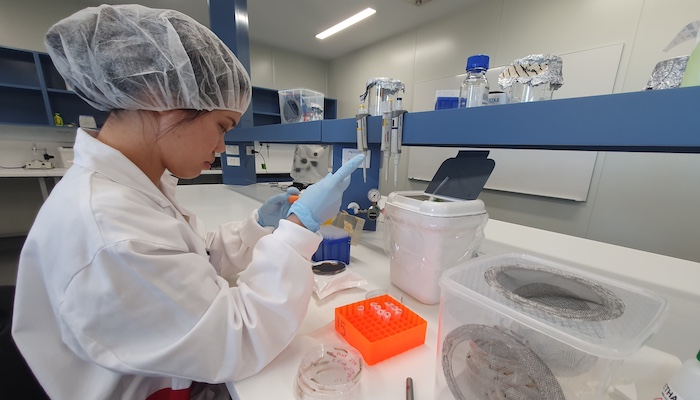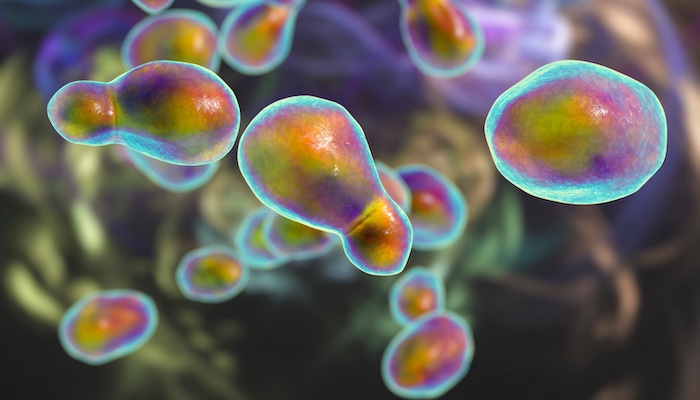Two cannabis-derived compounds have shown remarkable effectiveness against fungal pathogens in laboratory tests, according to new Macquarie University research.

Promise: Dr Hue Dinh, pictured, and colleagues at the Macquarie University Galleria laboratory are hopeful their discovery will lead to new treatments for common skin infections.
In a study published in The Journal of Neglected Tropical Diseases (PLOS NTDs), researchers discovered that bioactives Cannabidiol (CBD) and Cannabidivarin (CBDV) killed harmful Cryptococcus neoformans - a WHO-listed priority fungal pathogen. The compounds also killed dermatophytes that cause common skin infections, and much faster than existing treatments.
The findings open a door to possible new treatments for these fungal infections.
Fungal infections affect more than one billion people around the world each year, according to data from the Centres for Disease Control and Prevention. Whether it’s athlete’s foot, a yeast infection, or the potentially deadly lung infection pneumocystis pneumonia, fungal pathogens are a serious health threat with relatively few effective treatments.
Macquarie University’s Dr Hue Dinh, a postdoctoral research fellow in the School of Natural Science, and Associate Professor Amy Cain, resolved to tackle the growing threat of fungal infections with help from Professor Mark Connor and Dr Marina Junqueira Santiago from the Macquarie School of Medicine and collaborators at the Universities of Sydney and NSW.
Having worked in the field of antimicrobial resistance, Dr Hue Dinh knew that developing an entirely new drug and getting it to market could take decades. It made more sense to work with pharmacological compounds already approved for use in humans for other conditions, because their safety and mechanism of action are already well known.
Cannabis connection
Dr Dinh says one of the challenges in the research project was deciding which cannabinoids to test, and against what.
“Hundreds of natural compounds can be extracted from the cannabis plant, and we don't know which ones work," says Dr Dinh.
Macquarie Medical School pharmacologist Professor Mark Connor, who has a strong background in researching cannabioids, joined the team in their quest to target the fungal pathogen, Cryptococcus neoformans, which causes deadly lung or brain infections.
“When Cryptococcus neoformans gets to your central nervous system, it causes life-threatening meningitis. The mortality rate is very high, and it's really hard to treat,” says Dr Dinh.
The researchers found two cannabinoids – cannabidiol and cannabidivarin – that both quickly killed Cryptococcus neoformans in the laboratory, working even faster than current antifungal therapy.
They tested the compounds against 33 other fungal pathogens from clinical, veterinary and environmental settings. This revealed the cannabinoids were effective in killing a range of Cryptococcus species as well as the fungal skin pathogens that cause athlete’s foot.
Future applications
The final part of the study confirmed the cannabinoids could treat a fungal infection in a living organism – the Galleria mellonella (wax moth) larvae – bringing this treatment a step closer to patients.

Powerful infection: Pathogenic yeast fungus Cryptococcus neoformans causes cryptococcal meningoencephalitis and lung disease in immunocompromised patients.
The pilot study is an exciting advancement in the search for effective topical treatments because research shows pathogens are less likely to develop resistance to cannabinoids compared to other antimicrobials, Dr Dinh says.
- Breakthrough reveals how superbug infects and resists antibiotics
- Hope for frozen shoulder treatment: new trial
Intravenous administration of cannabinoids to treat systemic infections like lung or brain fungal infections will be more challenging, according to Dr Dinh, as cannabinoids aren’t easily dissolved into injectable formulations.
But Dr Dinh has high hopes for topical treatments for common skin infections - she and Associate Professor Cain are currently working with commercial partners to develop a product for over-the-counter use.
“If we can demonstrate that these ones work well for common infections, you could actually just get some CBD oil and then rub it on your skin to treat it."
Dr Hue Dinh is a Postdoctoral Research Fellow in the School of Natural Sciences at Macquarie University.
Associate Professor Amy Cain is a biologist in the School of Natural Sciences and ARC Future Fellow.



